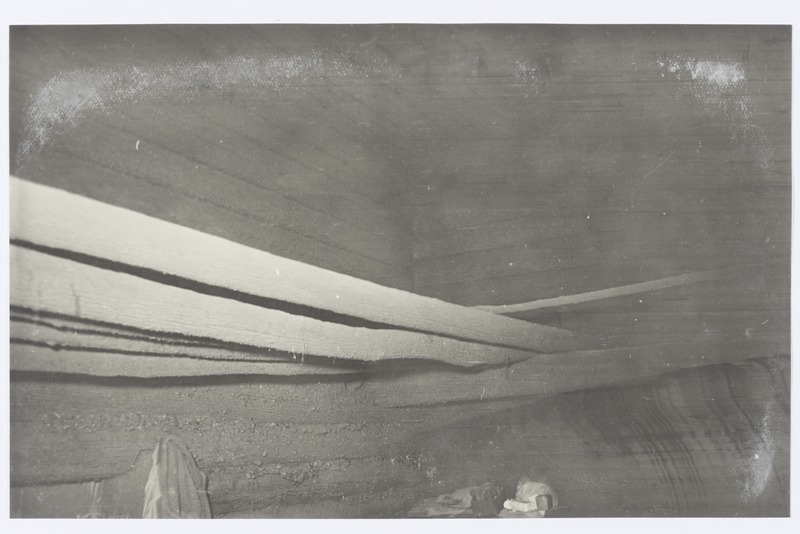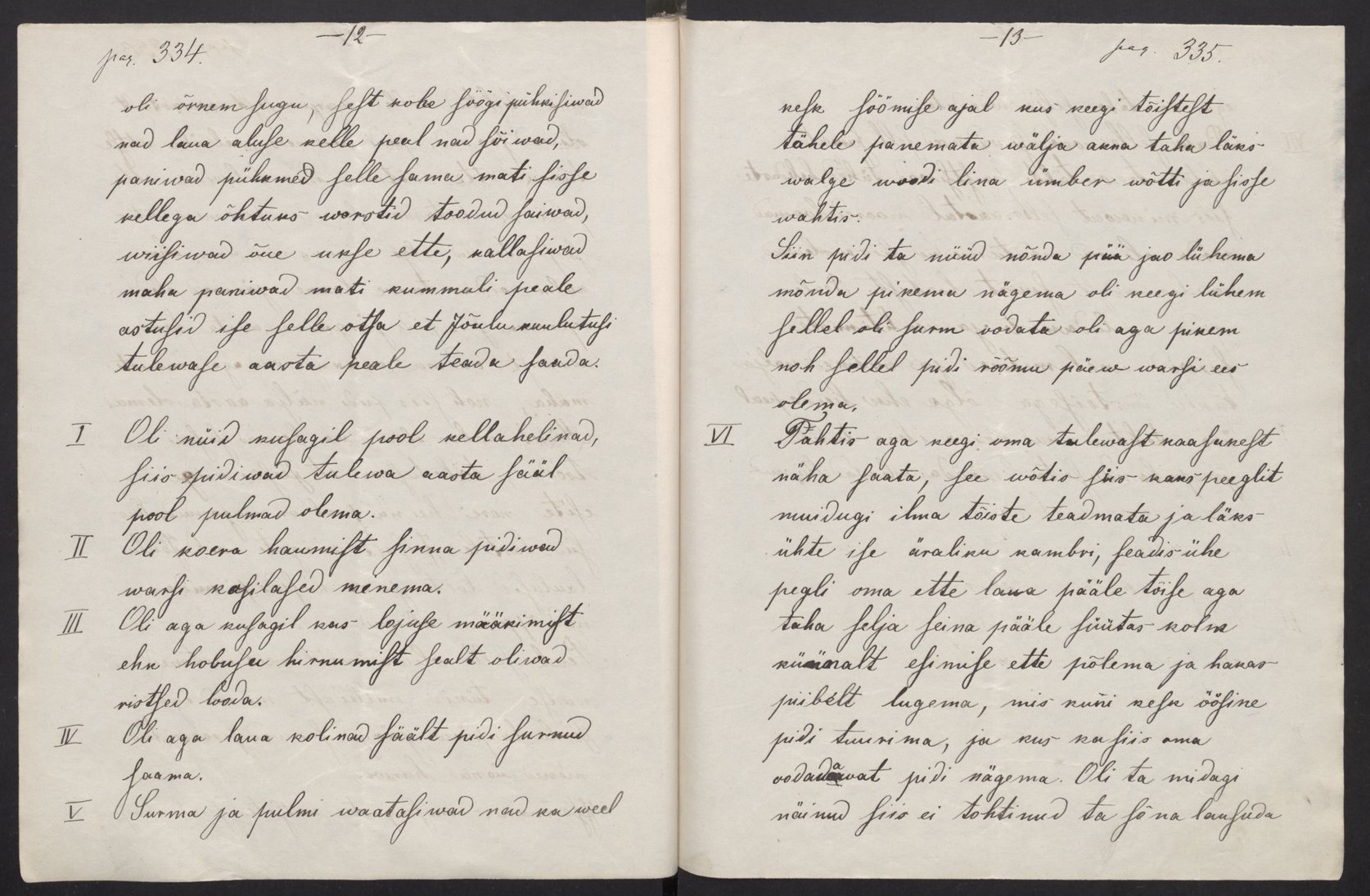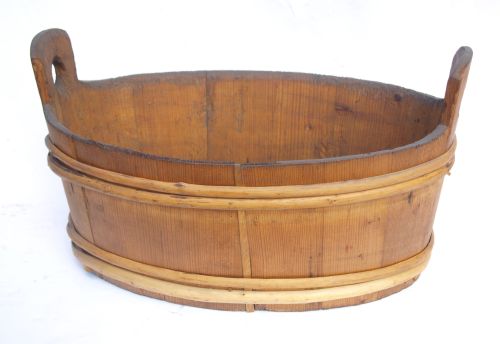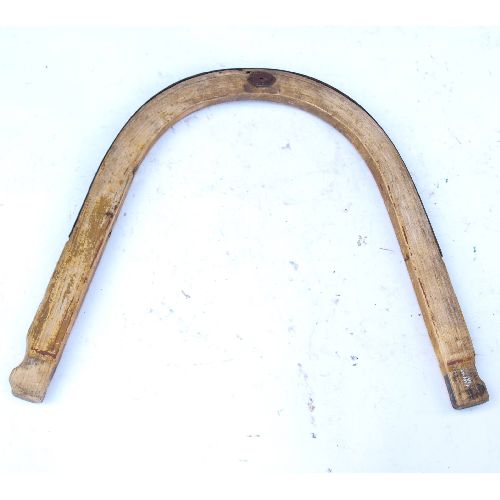Christmas and New Year
It was the gentler sex who were especially keen on such predictions, and immediately after the meal they wiped the top of the table on which they had eaten. They put the scraps in the same vessel with which the sausages had been brought for the evening. They then took the vessel outside and emptied it out by the front of the door. They overturned the vessel and sat on its bottom to find out the Christmas announcements for the coming year.
Iseäranis niisuguste katsete [ennustamiste] peale hagav1 oli õrnem sugu, sest kohe söögi [järel] pühkisivad nad laua aluse, kelle peal nad sõivad, panivad pühkmed selle sama mati2 sisse, kellega õhtuks vorstid toodud saivad, viisivad õue ukse ette, kallasivad maha, panivad mati kummuli peale, asusid ise selle otsa, et jõulu kuulutusi tulevase aasta peale teada saada.
1 agar
2 puunõu
For Christmas there was hay and for the New Year straw on the ground, and they slept on the hay. Sausages were cooked and the table was covered for the night so that the spirits would visit. Clean linen was put on the bed, but the people slept on the hay. They whisked themselves in the threshing room, as there was not such a separate sauna, especially in the house of the manor’s farmhands – they washed themselves in their own room, in the wooden trough.
Jõulust1 olid einad ja uuest aastast2 olid õled maas, heinte peal magati. Vorstid küpsetati ära ja laud kaeti ööseks, et vaimud pidid käima. Voodi pandi puhas pesu, aga oma inimesed magasid eintel. Vihtlesid rehetoas, ega niisukest sauna ei olnud; eriti moonamajas3 seda ei olnud, pesti oma toas, vanni sees.
1jõuluks
2 uueks aastaks
3 mõisatööliste majas
On New Year's Eve, straw is brought into the room. The straw-carrier enters the room with a sheaf, saying on the threshold:
"Hello, family here! Do you have permission for the New Year to come in?"
The answer is: "Hello, in the name of God, come yourself and bring the New Year."
Comment: The straw (or hay), brought inside for the winter holidays, was called the Christmas or New Year as if the sheaf itself were the personification of the holidays.
Vana-aasta õhtul tuuakse õlgi tuppa. Õlgede tooja astub vihuga tuppa, lävel üteldes:
"Tere, siit pere! Kas nääril luba tuppa tulla?"
Vastatakse: "Tere Jumala nimel Tule ise ja too näärid kaasa."
In the country, during the evening, straw is brought into the room so that a good spirit can sleep in the bed and will not bring misfortune during the year.
Õhtul tuuakse maal õled tuppa, et siis hää vaim saab voodis magada ja ei toob sel aastal õnnetusi.
On New Year's Eve, straw was brought into the room and all sorts of tricks were done. Sometimes they would string a horse's shaft bow to the ceiling and swing in it.
Vana-aasta õhtul toodi õled tuppa ja tehti siis igasuguseid tempe. Mõnikord kinnitati nööridega lae külge hobuse look ja siis kiiguti selles.
When I was still a girl, straw was brought into the room on New Year's Eve. Children frolicked on it and slept there too. On New Year's Eve, luck was poured from melted tin. After looking at its shadow, they tried to decipher the meaning of the image of this lump of tin and predict the future according to the image. After 12 o'clock at night, bread was brought to the animals.
Comment. Tin had been heated in a ladle and poured into water for telling the fortune.
Kui ma tütarlaps olin, siis toodi vana-aasta õhtul õlgi tuppa. Lapsed hullasid nende peal, ja seal magati ka. Vana-aasta õhtul valati õnne tinast. pärast varju pealt püüti mõistatada selle tinaklombi kujutise tähendust ja selle järgi ennustati tulevikku. Peale kella 12 öösi viidi loomadele leiba.

On this night, too, straw was brought in the old days, and then thrown carefully against the house’s ceiling and crossbars. If there was a lot of straw left hanging on the ceiling and the bars, the following summer good rye would grow.
Also, the farmer used to take a handful of each grain and throw it against the ceiling of the room saying: "God let our grain grow so long this year!"
At midnight they poured out good luck from the melted tin , poured from the ladle, and listened outside on an upturned sieve on the pile of sweepings. – Where the planks were clattering and rumbl ing, there would be a funeral that year; where a child's shriek of joy was heard, there would be a christening; where there was a cheer, there would be a wedding. On New Year’s Morning, bread was given to the horses and the livestock, and crosses were made on all the doors and thresholds with a burnt stick. On that day they hurried home from church, for whoever got home first would be the first to finish their work for the whole coming year.
Ka sellel õhtul olla enne vanasti õled sisse toodud, mida siis hoolega vastu tare lage ja parsi visatud. Kui siis hästi palju kõrsi lakke ja partele rippuma jäänud, siis kasvanud järgmisel suvel head rukkid.
Ka olla peremees igast viljast peotäie võtnud ja vastu toa lage visanud ja ütelnud: "Jumal lasku meie vilja sel aastal nii pikaks kasvada!"
Keskööl valatud tinast õnne ja kuulatud väljas pühkmehunniku otsas kummuli sõela peal – kus laudu kolistatud, seal tulla sel aastal matused; kus lapse karjumise rõõmu kuuldud, seal tulla ristsed; kus hõisatud, seal tulla pulmad. Uueaasta hommikul antud hobustele ja elajatele [=kariloomadele] leiba ja tehtud ka kõigi uste ja lävede peale peeruga ristid. Sellel päeval tõtatud kirikust õige kiiresti koju, sest kes kõige enne koju jõudnud, see olla ka kogu tuleva aasta jooksul oma tööd kõige enne jõudnud ära teha.



